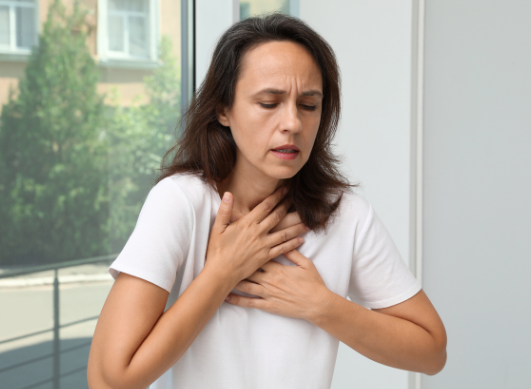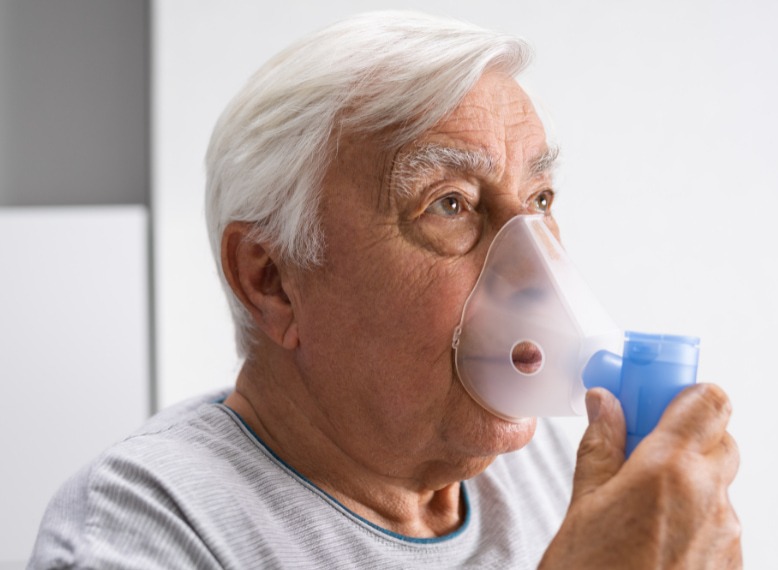COPD and GERD: What is the link between the two?
Published Jul 10, 2021 • By Courtney Johnson
Chronic obstructive pulmonary disease (COPD) affects 16 million Americans, though many millions more are living undiagnosed and untreated. Many COPD patients may, to their surprise, also develop acid reflux and studies have shown a potential association between the two.
What is the link between COPD and GERD? What are the symptoms and risk factors for GERD? How can you manage both COPD and GERD?
Read on to learn more!

Chronic obstructive pulmonary disease (COPD) affects around 16 million Americans, though millions more are living undiagnosed and untreated. COPD is characterized by chronic inflammation of the bronchial tubes which carry air to and from the lungs, therefore preventing oxygen from flowing from the lungs into the bloodstream.
Many COPD patients may also experience acid reflux, a painful and chronic condition that can significantly impact quality of life.
What is Gastroesophageal reflux disease (GERD)?
Gastroesophageal reflux disease (GERD) is a common condition that affects around 20% of the general population. Also called acid reflux, it is a digestive disorder in which contents of the stomach flow back into the esophagus. This occurs when the lower esophageal sphincter, the valve between the stomach and the esophagus, malfunctions and does not close properly.
It is estimated that more than half of patients with severe COPD are also affected by GERD, a situation that can make COPD harder to manage, worsening symptoms and triggering exacerbations.
What are the symptoms and risk factors of GERD? How do they affect COPD?
The most common symptoms of GERD are heartburn and acid regurgitation. Heartburn is a burning sensation in the chest which usually occurs after eating and tends to worsen at night, and acid regurgitation is the backing up of sour or bitter-tasting stomach acid into the throat or mouth.
Other less commonly occurring symptoms include indigestion; chest pain; ear, nose, and throat problems; coughing; and wheezing.
Many GERD patients develop lung issues, especially if they are experiencing acid reflux overnight. The gastric acid that backs up into the esophagus can also be inhaled into the lungs, which can lead to pneumonia, bronchitis, chronic cough, or interstitial fibrosis.
Smoking, the number one risk factor for COPD, is also a frequent risk factor for GERD. Other significant risk factors include:
- Obesity – increased pressure on the abdomen weakens the barrier between the esophagus and the stomach
- Pregnancy
- Drinking certain beverages (alcohol, carbonated drinks, coffee, tea)
- Eating certain foods (fatty, fried, acidic, spicy, citrus, or chocolate-based foods in particular)
- Certain medical conditions (hiatal hernia, gastroparesis, peptic ulcer, etc.)
- Certain medications (pain relievers like ibuprofen and aspirin, certain antibiotics such as tetracycline and clindamycin, iron supplements, calcium channel blockers, statins, anticholinergics, etc.)
What is the link between COPD and GERD?
Research has shown that more than half of severe COPD patients also have GERD, making it more common among people with COPD than people who do not have COPD.
More research is needed to determine the exact reasons why people with COPD are more likely to have GERD, but initial studies have indicated that dyspnea (labored breathing) and lung hyperinflation, two common symptoms of COPD, may have a hand in the matter. It is hypothesized that trapped air in the chest cavity may increase pressure on the abdomen, thus leading to acid reflux.
Studies have also found an association between GERD and a higher rate of exacerbations and increased risk for hospitalization among COPD patients. GERD can worsen COPD symptoms and therefore trigger a serious flare-up of extreme shortness of breath and coughing up sputum because the stomach acids backing up into the esophagus can also be inhaled into the lungs. These gastric acids would be irritating to the lungs of a person in perfect health, so for COPD patients who have damaged lungs with low reserve lung capacity, the effect is even more severe.
Finally, another potential explanation for the connection between COPD and GERD may be medications. Doctors believe that certain medicines used in treating COPD may weaken the valve between the stomach and the esophagus. COPD medications that may contribute to the worsening of GERD symptoms include corticosteroids, beta-agonists, and theophylline (an oral bronchodilator).
How can patients manage both COPD and GERD?
As COPD and GERD are two distinct medical conditions, it is important that both be treated. Like with COPD, receiving an accurate GERD diagnosis is crucial to finding the most effective treatment.
Managing GERD symptoms can help to alleviate COPD symptoms and overall improve patient quality of life. If left untreated, GERD can worsen with time, so if you are experiencing GERD symptoms be sure to make an appointment with your doctor.
There are several steps you can take to help manage GERD symptoms, notably:
- Avoiding trigger substances such as alcohol or spicy foods, particularly before bedtime.
- Use an extra pillow at night to keep your head elevated.
- Quit smoking.
- Follow a regular exercise routine and stay active.
- Make sure you and your doctor are aware of any medications that may contribute to your symptoms.
Was this article helpful to you?
Share your thoughts and questions with the community in the comments below!
Take care!
Sources:
- Chronic Obstructive Pulmonary Disease (COPD), CDC
- COPD, Mayo Clinic
- Gastroesophageal reflux disease (GERD), Mayo Clinic
- Understanding Gastoesophageal Reflux Disease, American Society for Gastrointestinal Endoscopy
- Acid Reflux Linked to Higher Risk of COPD Exacerbations, Review Suggest, COPD News Today
- Living with COPD and GERD, Lung Health Institute
- COPD and GERD: The Connection Between Your Symptoms, EverydayHealth
- Living with GERD and COPD, VeryWellHealth

 Facebook
Facebook Twitter
Twitter


